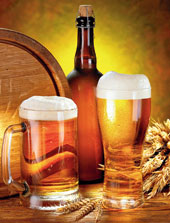 |
The BJP threw a fit in Parliament early this week over a US company naming a beer Kali-Ma. It could have done better and launched a sustained tantrum. The previous day, MPs from all parties had united to ban cartoons from school textbooks following the uproar over Ambedkar’s cartoon. No wonder a contemporary cartoonist feels that cartoonists are an endangered species in India as politicians here are funnier.
Unfortunately, the beer episode came to a quick close as the trembling Burnside Brewing Company of Portland, Oregon, promptly postponed its launch and issued a plaintive statement on Facebook, claiming the inspiration for the label came from an innocuous Indiana Jones film that featured a Kali statue. The company is still issuing apologies on the Net.
The BJP had not done its homework well. There is much more reason to object to about the links between the goddess Kali and alcohol. Back home too. In Bengal. In this state, copious quantities of country liquor go by the name of the goddess. “Bangla”, the strong “country liquor” distilled from molasses, so called because it is prepared locally, is often called “Kali Mata”. So much so that many think this is a brand, when it is actually a generic name given to the inexpensive spirit that is common as an offering during Kali puja.
The situation becomes more complicated as the alcohol, everyone knows, is used with religious sanction. It is integral to the goddess’ worship according to Tantric tradition, especially in its Vamachara or left-hand method. Madya (wine/liquor/alcohol), along with matsya (fish), mangsho (meat), mudra (parched grain) and maithun (ritual sex) constitute the panch makaras partaken of by the Tantric practitioner, lists Purba Sengupta, author and senior research fellow at the Indology department of Ramakrishna Mission Institute of Culture. Tantrik rituals do not denounce worldly means but prescribe attaining the goal by transcending them. The Hindu religion allows so much.
The most glaring gap in the BJP’s education is evident in the attention it did not pay to the actual relationship between the goddess and alcohol, something it could have used to its advantage. It is crude to identify Kali with alcohol, says social historian Gautam Bhadra. The goddess does not consume the liquid, the bamacharis, the Tantrik worshippers, do.
During Kali puja, the goddess’ finger is dipped into karan bari, which transforms the alcohol into amrita, says Bhadra. This doesn’t mean that wine/liquor/alcohol always has to be redeemed of its essential properties for the consumption of gods or goddesses. Many of the Dashamahavidyas — the 10 aspects of the Mother Goddess — drank it. According to many accounts, Dhumavati and Chhinnamasta liked to drink. If Kali doesn’t drink, other heavenly beings do. “A beer that identifies itself with Kali and its ban are equally simplistic,” says Bhadra.
The agitators are not alone, however. Several dignitaries, including a chief minister, remain offended by cartoons. For them, perhaps a few international landmarks of correction could be useful. Some US councils and organisations apparently banned any term using the word “man” as a prefix or suffix, which has been ruled politically incorrect. “Manhole” is now referred to as a “utility” or “maintenance” hole. A school in Seattle apparently renamed its Easter eggs “spring spheres” to avoid causing offence to people who did not celebrate Easter.










